Cereals continue to suck the wind from the sails of breakfast food makers’ stocks, but one is doubling down on the category to try to reverse the slumping demand.
“We could have lifted our foot off the gas pedal on our expansion of single-serve on-the-go items … but we chose not to do so,” Kellogg chief executive officer Steven A. Cahillane said during a third quarter earnings call Oct. 31 while explaining why operating profits had fallen.
“You see a market improvement in morning foods; still much work to be done, but much improved.”
Read Also

Farming Smarter receives financial boost from Alberta government for potato research
Farming Smarter near Lethbridge got a boost to its research equipment, thanks to the Alberta government’s increase in funding for research associations.
Once the kings of breakfast, cereals like Kellogg’s Rice Krispies have faced headwinds in recent years as growing numbers of consumers switch to other breakfast options.
The lower earnings announced by Kellogg caused shares to briefly fall almost 10 percent, wiping out its share price gain for the year.
That’s not an abnormal situation for similar companies. General Mills, the maker of Cheerios and many other breakfast cereals and snacks, has suffered since hitting a July 2016 peak above $71 per share. Today’s $44 price takes it back to the 2013 levels it looked like it had left behind.
Both companies and others in the industry have been working diligently to revive old brands, introduce new products and build new markets, but it’s tough slogging.
“We’re putting more investment dollars to work in certain businesses and capabilities, and we’ve decided to continue to expand single-serve (products), even in a high freight-cost environment,” said Cahillane.
Single-serve portions of old cereal standbys and new forms of old cereals have been growing quickly, the company said, and it is investing in new packing capacity to boost production and keep packaging in-house.
Kellogg is also boosting its efforts in “wellness-oriented adult” food products, like Raisin Bran and Mini-Wheats.
The slump in the share price revealed market skepticism about Kellogg’s ability to reverse sales weakness and wring higher profits out of its products, but Cahillane heralded his company’s decision to incur investment costs to revive and build brands.
“We feel very good about the direction we’re heading. Our portfolio is being shaped toward growth,” said Cahillane.


















